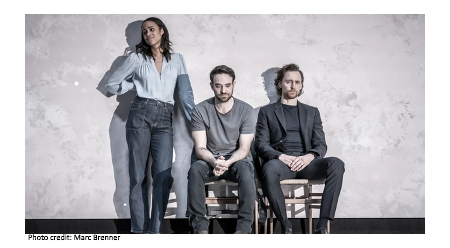

Posted 9/6/2019

The latest revival of Harold Pinter’s Betrayal on Broadway is both subtle and remarkable.
That’s thanks to an excellent cast — Tom Hiddleston, Zawe Ashton and Charlie Cox — and seamless direction by Jamie Lloyd that strips the play’s cool emotionalism to its essence.
On the surface, Betrayal, now at the Bernard B. Jacobs Theater, is one of Pinter’s more accessible plays.
It accomplishes this by reversing the timeline of the standard extramarital affair to reveal the myriad betrayals that ripple outward from the central infidelity. By starting the play at the end of the affair, Betrayal becomes an autopsy of love.
We are allowed to focus on the shifting alliances, casual alienation and layers of deception that echo through the lives of a married couple Robert (Hiddleston) and Emma (Ashton), and Emma’s lover and Tom’s close friend Jerry (Cox).
The revelation in the staging is how each party in the romantic triangle is always physically present on stage, persistent as a wounded ghost. That’s true even in the most intimate moments shared by the remaining pair. It is a spatial representation of the emotional enormity of infidelity.
The action takes place in restaurants, family homes, a regular assignation address and a Venetian hotel. The three central characters are satellites helplessly caught in each other’s gravitational pull.
The choice to introduce an unexpected character late in the play raises the stakes and serves as a reminder of the collateral damage of marital deceit. It also challenges the hermetic self-absorption of the romantic triangle.
As Jerry, the third wheel on this bicycle built for two, Cox captures the confidence and sometimes cluelessness of a man whose vague dissatisfaction with his own life causes him to overstep the boundaries of friendship.
In the less demonstrative yet more emotionally nuanced role of Robert, Hiddleston neatly coveys the shifting reality of the deceived third party. The tart playfulness of the play becomes a question of what Robert knew and when he knew it.
The middle scenes, in which we are aware that Robert knows about the affair, but Jerry doesn’t know his friend knows, are a bitterly comic prelude to disaster. Cox savors every thinly veiled hint of his hurt and contempt for his best friend and worst rival, like a cat batting around a stunned mouse, hesitating to move in for the kill because it might ruin the game.
Not merely the object of competition between her husband and lover, Zawe Ashton makes Emma the willing architect of her own romantic complications. She stalks and paces the stage like a prisoner finally allowed into the exercise yard. The moment when she reveals her transgression to her husband devastates; the shattered intimacy is palpable.
Soutra Gilmour’s bare sets and monochromatic costumes add to the sadness of the story.
Deftly directed by Jamie Lloyd, Harold Pinter’s Betrayal navigates the architecture of adultery and the inevitable collision as lives veer off course. Told in reverse order, the play skillfully reveals how a relationship’s ending seems contained in its first big bang. —Fern Siegel